- Home
- Elmore Leonard
City Primeval Page 2
City Primeval Read online
Page 2
Clement got out and walked around to the driver's side of the Mark. He had to reach way in to pull the guy upright and then out through the door opening, careful, trying not to touch the blood that was all over the guy's light-blue suit. The guy was a mess. He didn't look Cuban now; he didn't look like anything. The girl was still screaming.
Clement said, Hey, shut up, will you?
She stopped to catch her breath, then began making a weird wailing sound, hysterical. Clement said, Hey! He saw it wasn't going to do any good to yell at her, so he hunched himself into the Mark with one knee on the seat and punched her hard in the mouth not with any shoulder or force in it but hard enough to give her a drunk-dazed look as he backed out of the car. Clement stooped down to get the guy's billfold, holding the guy's coat open with the tips of two fingers. There were three one-hundred-dollar bills and two twenties inside, credit cards, a couple of checks, ticket stubs from the track and a thin little 2 by 3 spiral notebook. Clement took the money and notebook. He leaned into the Continental again, bracing his forearm against the steering wheel, pulled the keys from the ignition and said to the girl giving him the dazed look, Come on. Show me where your boyfriend lives.
They drove over Eight Mile to Woodward and turned south, Clement glancing at the girl sitting rigidly against the door as he gave her a little free advice.
You take up with colored you become one of them. Don't you know that? Whether it's a white girl with a jig or a white guy with a colored girl, you're with them, you go to their places. You don't see the white guy taking the little colored chickie home or the white girl neither. He ever come to your place?
The girl didn't answer, one hand on her purse, the other still holding onto her gold chains. Hell, he didn't want her chains, even if they were real. You start fooling around trying to fence shit like that . . .
I asked you a question. He ever come to your place?
Sometimes.
Well, that's unusual. What was he in, numbers, dope? He's too old to be a pimp. He looked like a pimp, though. You know it? I can't say much for your taste, Jesus, a guy like that Where you from? You live in Detroit all your life?
She said yes, not sounding too sure about it. Then asked him, What're you gonna do to me?
I ain't gonna do nothing you show me where the man lives. He married?
No.
But he lives in Palmer Woods? Those're big houses.
Clement waited. It was like talking to a child.
They passed the State Fairgrounds off to the left, beyond the headlights moving north to the suburbs, going home. The southbound traffic was thin, almost to nothing this time of night, the taillights of a few cars up ahead; but they were gone by the time Clement stopped for the light at Seven Mile. He said, This ain't my night. You know it? I believe I've caught every light in town. The girl clung to her door in silence. We turn right, huh? I know it's just west of Wood'ard some.
He heard the girl's door open and made a grab for her, but she was out of the car, the door swinging wide and coming back at him.
Shit, Clement said.
He waited for the light to change, watching the pale pink figure running across Seven Mile and past the cyclone fence on the corner. All he could see was a dark mass of trees beyond her, darker than the night sky, the girl running awkwardly, past the fence and down the fairway of the public golf course, Palmer Park Municipal running with her purse, like she had something in it, or running for her life. Dumb broad didn't even know where she was going. A Detroit Police station was just down Seven a ways, toward the other side of the park. He'd been brought in there the time he was picked up for hawking a queer and released when the queer wouldn't identify him. If he remembered correctly it was the 12th Precinct.
Clement jumped the car off the green light so the door would slam closed, turned right, cut across Seven Mile in a jog to the left and came to a stop at the edge of the golf course parking lot. The girl was running down the fairway in his headlight beams, straight down, not even angling for the trees. Clement got out and went after her. He ran about a hundred yards, no more, and stopped, even though he was gaining on her.
He said, What in hell you doing, anyway? Getting your exercise?
Clement extended the Walther, steadied it in the palm of his left hand, squeezed off a round and saw her stumble Jesus, it was loud and shot her twice more, he was pretty sure, before she hit the ground.
Anybody standing there, Clement would have bet him the three rounds had done the job. Except he saw the girl, for just a second, sitting in a Frank Murphy courtroom fingering her chains. Better to take an extra twenty seconds to be sure than do twenty years in Jackson. Clement went to have a look. He saw starlight shining in her eyes and thought, That wasn't a bad looking girl. You know it?
Walking back to his car Clement realized something else and said to himself, You dumb shit. Now you can't go to the man's house.
Chapter 2
I THINK YOU'RE AFRAID OF WOMEN, the girl from the News said. I think that's the root of the problem.
Raymond Cruz wasn't sure whose problem she was referring to, if it was supposed to be his problem or hers.
She said, Do you think women are devious?
You mean women reporters?
Women in general.
Sitting in Carl's Chop House surrounded by an expanse of empty white tablecloths, their waitress off somewhere, Raymond Cruz wondered if it was worth the free drinks and dinner or the effort required to give thoughtful answers.
No, he said.
You don't feel intimidated by women?
No, I've always liked women.
At certain times, the girl from the News said. Otherwise, I'd say you're indifferent to women. They don't fit into your male world.
Wherever she was going the girl writer with the degree from Michigan and four years with The Detroit News seemed to be getting there. It was ten past one in the morning. Her face glistened, her wine glass was smudged with prints and lipstick. The edge remained in her tone and she no longer listened to answers. Raymond Cruz was tired. He forgot what he was going to say next and was rescued by their waitress, smiling through sequined glasses.
I haven't heard your beeper go off. Must be a slow night.
Raymond touched his napkin to his mustache and gave her a smile. No, it hasn't, huh? And said to the girl from the News, One time Milly heard my beeper three tables away. I had it on me and didn't even hear it.
You weren't feeling no pain either, the waitress said. I come over to the table. I said isn't that your beeper? He didn't even hear it. She picked up his empty glass. Can I get you something else?
The girl from the News didn't answer or seem interested. She was lighting another cigarette, leaving a good half of her New York strip sirloin untouched. She already had coffee. Raymond said he'd have another shell of beer and asked Milly if she'd wrap up the piece of steak.
The girl from the News said, I don't want it.
He said, Well, somebody'll probably take it.
You have a dog?
I'll eat it for breakfast. Here's the thing, Raymond said, trying to show a little interest. A man wouldn't say to me, 'yI think you're afraid of women.' Or ask me if I think women are devious. Women ask questions like that. I don't know why, but they do.
Your wife said you never talked about your work.
His wife The girl from the News kept winging at him, coming in from blind sides.
Raymond said, I hope you're a psychiatrist along with being a reporter you're getting into something now. In the first place she's not my wife anymore, we're divorced. Is that what you're writing about, police divorce rate?
She feels you didn't say much about anything, but especially your work.
You talked to Mary Alice? Sounding almost astonished. When'd you talk to her?
The other day. How come you don't have children?
Because we don't, that's all.
She said you seldom if ever showed any emotion or told her how you felt.
Men in other professions, they have a problem at work, they're not getting along with a customer or their boss, they come home and tell their wives about it. Then the wife gives hubby a few sympathetic strokes poor baby it's why he tells her.
The waitress with the gray hair and sequined glasses, Milly, placing his shell of beer on the table, said, Where's your buddy?
The girl from the News jabbed her cigarette out. She sat back and looked off across the field of tablecloths.
Who, Jerry?
The kinda sandy-haired one with the mustache.
Yeah, Jerry. He was gonna try and make it. You haven't seen him, huh?
No, I don't think he's been in. I wouldn't swear to it though. Who gets the doggie bag?
The girl from the News waited.
Just put it there, Raymond said. She doesn't take it, I will.
I have a name, the girl from the News said as the waitress walked away. Then hunched toward him and said, I think your values are totally out of sync with reality.
Raymond sipped his beer, trying to relate her two statements. He saw her nose in sharp focus, the sheen of her skin heightened by tension. She was annoyed and for a moment he felt good about it. But it was a satisfaction he didn't need and he said, What're you mad at?
I think you're still playing a role, the girl said. You did the Serpico thing in Narcotics. You thought Vice was fun
I said some funny things happened.
Now you're into another role, the Lieutenant of Homicide.
Acting Lieutenant. I'm filling in.
I want to ask you about that. How old are you?
Thirty-six.
Yeah, that's what it said in your file, but you don't look that old. Tell me . . . how do you get along with the guys in your squad?
Fine. Why?
Do you . . . handle them without any trouble?
What do you mean, 'yhandle them'?
You don't seem very forceful to me.
Tell her you have to go to the Men's, Raymond thought.
Too mild-mannered She stopped and then said, with some enthusiasm, making a great discovery, That's it you're trying to look older, aren't you? The big mustache, conservative navy-blue suit but you know how you come off?
How?
Like someone posing in an old tintype photo, old-timey.
Raymond leaned on the table, interested. No kidding, that's what you see?
Like you're trying to look like young Wyatt Earp, the girl from the News said, watching him closely. You relate to that, don't you? The no-bullshit Old West lawman.
Well, Raymond said, you know where Holy Trinity is? South of here, not far from Tiger Stadium? That's where I grew up. We played cowboys and Indians over on Belle Isle, shot at each other with B-B guns. I was born in McAllen, Texas, but I don't remember much about living there.
I thought I heard an accent every once in a while, the girl from the News said. You're Mexican then, not Puerto Rican?
Raymond sat back again. You think I was made acting lieutenant as part of Affirmative Action? Get the minorities in?
Don't be so sensitive. I asked a simple question. Are you of Mexican descent?
What're you, Jewish or Italian?
Forget it, the girl from the News said.
Raymond raised a finger at her. See, a man wouldn't say that either. 'yForget it.'
Don't point at me. The girl's anger rising that quickly. Why wouldn't a man say it, because he'd be afraid of you?
Or he'd be more polite. I mean why act tough?
I don't carry a gun, the girl from the News said, and I'm not playing the role, you are. Like John Wayne or somebody. Clint Eastwood. Don't you relate to that type? Want to be like them?
Do I want to be an actor?
You know what I mean.
I'm in homicide, Raymond said. I don't have to make up anything; it's usually dramatic enough the way it is.
Wow, is that revealing. She stared with a look that said she knew something he didn't. You're almost in contact with your center. You catch a glimpse of it and the transference is immediate. I have to be this way because of my job I don't like to look at my center, Raymond said, straight-faced.
A smart-ass attitude is another defense, the girl said. I think it's fairly obvious the basic impediment is all this machismo bullshit cops are so hung up on carrying the big gun, that trip. But I don't want to get into male ego or penis symbols if we can help it.
No, let's keep it clean.
The girl studied him sadly. I could comment on that, too, the immediate reference to sexuality as something dirty. It's not a question, lieutenant, of keeping it clean, but I guess we should try to keep it simple. Just the facts, ma'm, if you know what I mean.
He wondered if it was safe to speak. Then took a chance. I'll tell you what influenced me most, once I joined the force. The detective sergeants, the old pros. You had to be in at least twenty years to make detective sergeant. Now, we don't have the rank anymore. You don't wait your turn, you take a test and if you pass you move up.
Like you did, the girl from the News said. A lieutenant with only fifteen years seniority. Because you went to college?
Partly, Raymond said. If I was black I might even be an inspector by now.
The girl from the News perked up. Do I hear resentment, a little bias, perhaps?
No, you don't. I'm telling you how it is. The old pros are still around; but they've been passed up along the way by some who aren't pros yet.
You sound bitter.
No, I'm not.
Then you sound like an old man. In fact you dress like an old man. The girl from the News kept punching at him.
Dressing this afternoon, knowing he was going to be interviewed, Raymond had put on the navy-blue summer-weight suit, a white short-sleeved shirt and a dark-blue polka-dot tie. He had bought the suit five months ago, following his appointment to lieutenant. He had grown the mustache, he would have to admit, to look older, letting it grow and liking it more and more as it filled in dark and took a bandit turn down around the corners of his mouth. He felt the mustache made him look serious, maybe a little mean. He was five-ten and a half and weighed one-sixty-four, down fifteen pounds in the past few months. It showed in his face, gave him a gaunt, stringy look and made him appear taller.
The girl from the News brought it back to impressions, images, the possible influence of certain screen detective types, and Raymond said he thought movie detectives looked like cowboys. A mistake. The girl from the News jumped on that, said it was revealing and wrote something in her notebook. Raymond said he didn't mean real working cowboys, he meant, you know, the jeans, the denim outfits some of them wore. He said Detroit Police detectives had to wear coats and ties on duty. The girl from the News said she thought that was a drag.
They didn't seem to be getting anywhere. Raymond said, Well, if that's it . . .
You still haven't answered the question, the girl from the News said, giving him a weary but patient look.
Would you mind repeating it?
The question is, why can't a cop leave his macho role at headquarters and show a little sensitivity at home? Why can't you separate self from your professional role and admit some of your vulnerability, your fears, and not just talk about your triumphs?
It was the first time he had heard anyone use the word. Triumphs.
You know, like lowering her voice to sound masculine 'yWell, we closed another case, dear. Let's have a drink.' But what about your resentments, all the annoying, picky things that're part of your job?
Raymond nodded, picturing the scene. Okay, I come home, my wife says, 'yHow'd it go today, dear?' I say, 'yOh, not too bad, honey. I got something I want to share with you.'
The girl from the News was staring at him, a little hurt or maybe resigned. I was hoping we could keep it serious.
I'm serious. You're the wife. You say, 'yHi, honey. Have anything you'd like to share with me?' And I say, 'yAs a matter of fact, honey, I want to tell you something I learned today
about sharing, as a matter of fact.'
The girl from the News was suspicious, but said, All right, what?
Well, a young woman was murdered, Raymond said solemnly. Cause of death strangulation, asphyxia due to mechanical compression, traces of seminal fluid in mouth, vagina and rectum The girl from the News said, God.
So today we talk to a couple of suspects and one of them agrees to cop if we'll trade off with nothing heavier than manslaughter. We dicker around, offer him second degree and finally he says okay. He says actually it was his buddy that killed her. His buddy's fresh out of the joint and very horny. See, what happened, they met the girl in a bar and the guy making the statement says she was all over him. So they take her out in a field and after the first guy's done he lets his buddy have seconds.
Lieutenant
That's what he said, let his buddy have seconds. Well, the buddy gets in there and won't stop. I mean he just keeps, you know, going. Make a long story short, the girl starts screaming and the buddy panics and strangles her to shut her up. But, he's not sure she's dead. What if she comes to and identifies them in a lineup? So, they find this big chunk of concrete that'd been used to anchor a fence post weighed about a hundred pounds and they pick it up and drop it on the girl's face. Pick it up, drop it on her face again.
The girl from the News was reaching for her big mail-bag purse.
Pick it up, drop it. When we found her, we thought maybe a semi had run over her. I mean you wouldn't believe this was a girl's face.
I don't think you're funny.
No, it isn't funny at all. But then the guy said in his statement
The girl from the News was walking away from the table.

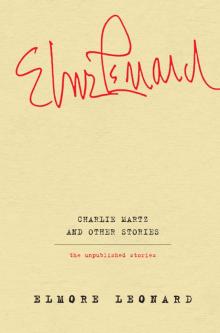 Charlie Martz and Other Stories: The Unpublished Stories
Charlie Martz and Other Stories: The Unpublished Stories Elmore Leonard's Western Roundup #2
Elmore Leonard's Western Roundup #2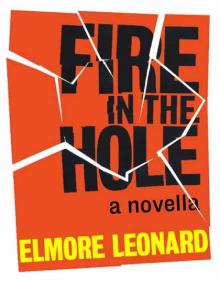 Fire in the Hole
Fire in the Hole Tishomingo Blues (2002)
Tishomingo Blues (2002)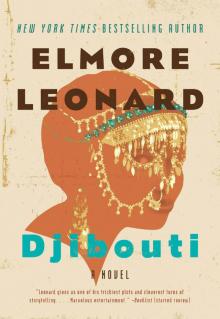 Djibouti
Djibouti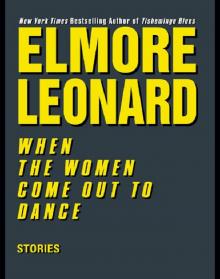 When the Women Come Out to Dance: Stories
When the Women Come Out to Dance: Stories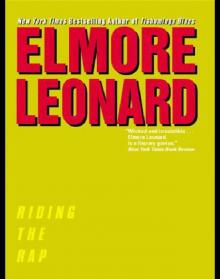 Riding the Rap
Riding the Rap Moment of Vengeance and Other Stories
Moment of Vengeance and Other Stories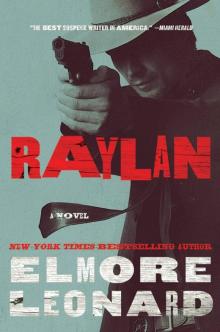 Raylan
Raylan Touch
Touch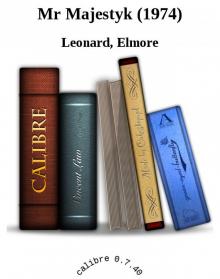 Mr Majestyk
Mr Majestyk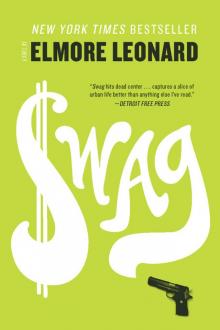 Swag
Swag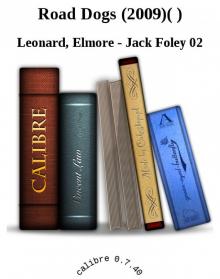 Road Dogs
Road Dogs La Brava
La Brava The Hot Kid
The Hot Kid Valdez Is Coming: A Novel
Valdez Is Coming: A Novel Be Cool
Be Cool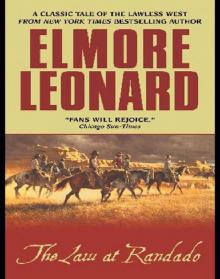 The Law at Randado
The Law at Randado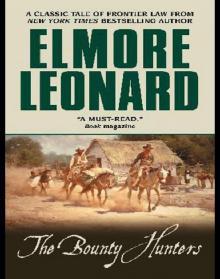 The Bounty Hunters
The Bounty Hunters When the Women Come Out to Dance
When the Women Come Out to Dance 310 to Yuma and Other Stories (1953)
310 to Yuma and Other Stories (1953)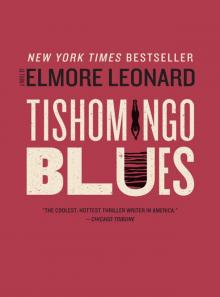 Tishomingo Blues
Tishomingo Blues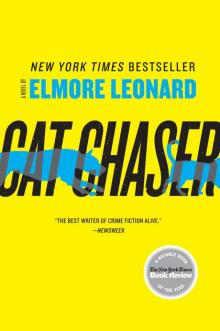 Cat Chaser
Cat Chaser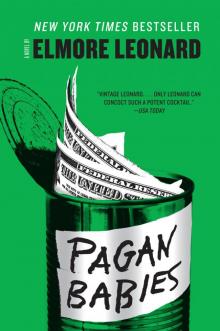 Pagan Babies
Pagan Babies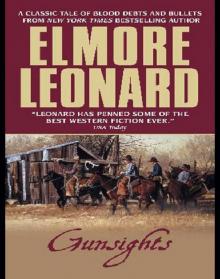 Elmore Leonard's Western Roundup #1
Elmore Leonard's Western Roundup #1 52 Pickup
52 Pickup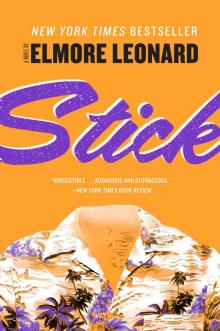 Stick
Stick The Moonshine War
The Moonshine War Valdez Is Coming
Valdez Is Coming City Primeval
City Primeval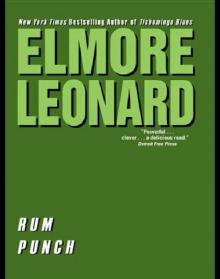 Rum Punch
Rum Punch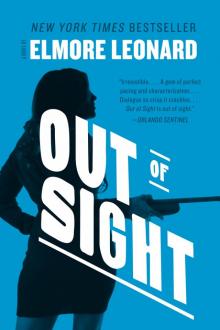 Out of Sight
Out of Sight Naked Came the Manatee (1996)
Naked Came the Manatee (1996) Killshot
Killshot Cuba Libre
Cuba Libre Forty Lashes Less One
Forty Lashes Less One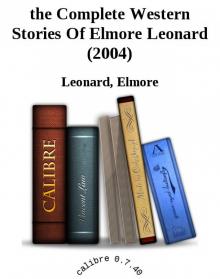 The Complete Western Stories of Elmore Leonard
The Complete Western Stories of Elmore Leonard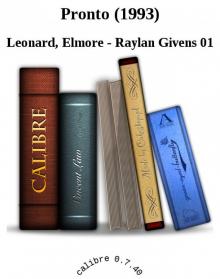 Pronto
Pronto Split Images
Split Images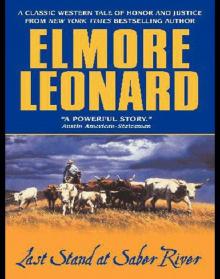 Last Stand at Saber River
Last Stand at Saber River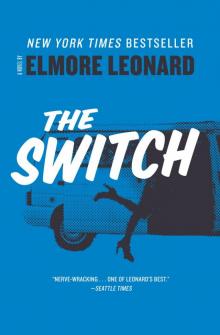 The Switch
The Switch Three-Ten to Yuma and Other Stories
Three-Ten to Yuma and Other Stories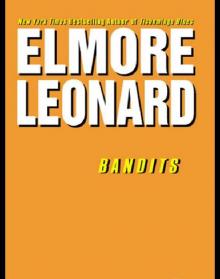 Bandits
Bandits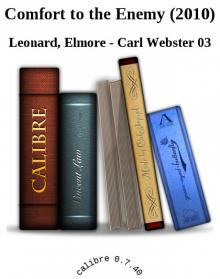 Comfort to the Enemy and Other Carl Webster Stories
Comfort to the Enemy and Other Carl Webster Stories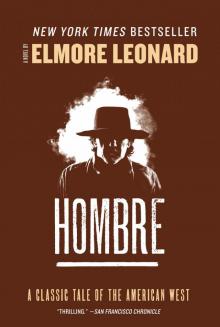 Hombre
Hombre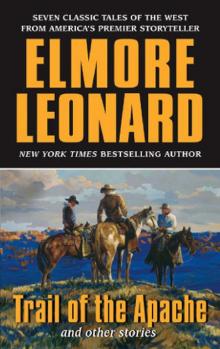 Trail of the Apache and Other Stories
Trail of the Apache and Other Stories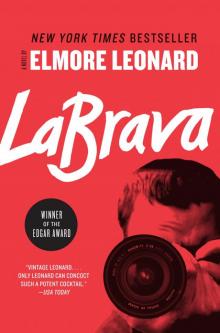 LaBrava
LaBrava Gold Coast
Gold Coast Jackie Brown
Jackie Brown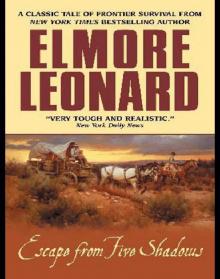 Escape From Five Shadows
Escape From Five Shadows Karen Makes out (1996)
Karen Makes out (1996)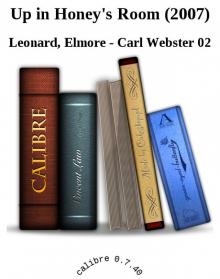 Up in Honey's Room
Up in Honey's Room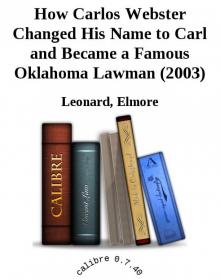 How Carlos Webster Changed His Name to Carl and Became a Famous Oklahoma Lawman (2003)
How Carlos Webster Changed His Name to Carl and Became a Famous Oklahoma Lawman (2003)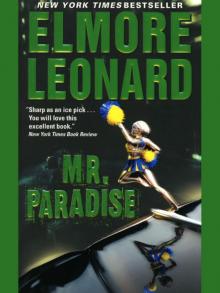 Mr. Paradise
Mr. Paradise The Hunted
The Hunted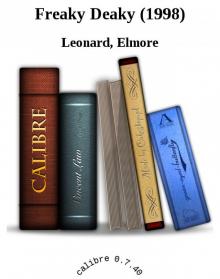 Freaky Deaky
Freaky Deaky Louly and Pretty Boy (Ss)
Louly and Pretty Boy (Ss)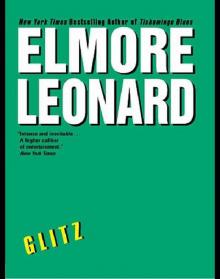 Glitz
Glitz A Coyote's in the House
A Coyote's in the House The Big Bounce jr-1
The Big Bounce jr-1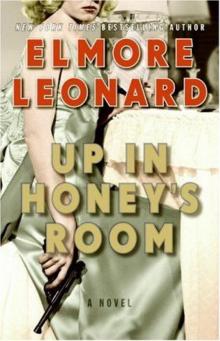 Up in Honey's Room cw-2
Up in Honey's Room cw-2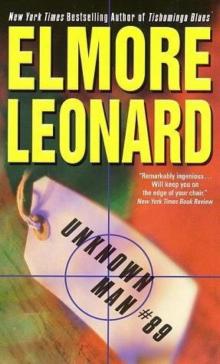 Unknown Man #89 jr-3
Unknown Man #89 jr-3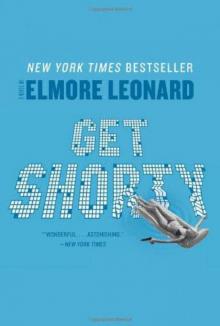 Get Shorty: A Novel cp-1
Get Shorty: A Novel cp-1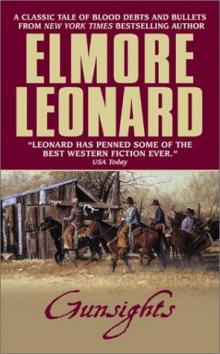 Gunsights
Gunsights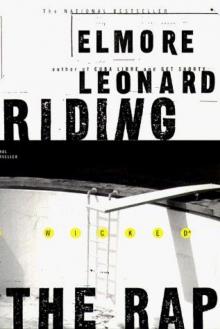 Riding the Rap rg-2
Riding the Rap rg-2